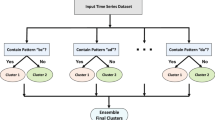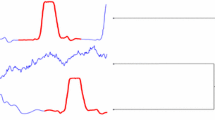Abstract
Clustering algorithms belong to a category of unsupervised learning methods which aim to discover underlying structure in a dataset without given labels. We carry out research of methods for an analysis of a biological time series signals, putting stress on global patterns found in samples. When clustering raw time series data, high dimensionality of input vectors, correlation of inputs, shift or scaling sensitivity often deteriorates the result. In this paper, we propose to represent time series signals by various parametric models. A significant parameters are determined by means of heuristic methods and selected parameters are used for clustering. We applied this method to the data of cell’s impedance profiles. Clustering results are more stable, accurate and computationally less expensive than processing raw time series data.
Access this chapter
Tax calculation will be finalised at checkout
Purchases are for personal use only
Preview
Unable to display preview. Download preview PDF.
Similar content being viewed by others
References
Han, J., Kamber, M.: Data mining: concepts and techniques. Morgan Kaufmann Publishers Inc., San Francisco (2000)
Bifulco, I., Fedullo, C., Napolitano, F., Raiconi, G., Tagliaferri, R.: Global optimization, meta clustering and consensus clustering for class prediction. In: Proceedings of the 2009 International Joint Conference on Neural Networks, IJCNN 2009, pp. 1463–1470. IEEE Press, Piscataway (2009)
Caruana, R., Elhawary, M., Nguyen, N., Smith, C.: Meta clustering. In: Proceedings of the Sixth International Conference on Data Mining, ICDM 2006, pp. 107–118. IEEE Computer Society, Washington, DC (2006)
Guyon, I., Luxburg, U.V., Williamson, R.C.: Clustering: Science or art. In: NIPS 2009 Workshop on Clustering Theory (2009)
Golay, X., Kollias, S., Stoll, G., Meier, D., Valavanis, A., Boesiger, P.: A new correlation-based fuzzy logic clustering algorithm for fmri. Magnetic Resonance in Medicine 40(2), 249–260 (1998)
Möller-Levet, C.S., Klawonn, F., Cho, K.-H., Wolkenhauer, O.: Fuzzy Clustering of Short Time-Series and Unevenly Distributed Sampling Points. In: Berthold, M., Lenz, H.-J., Bradley, E., Kruse, R., Borgelt, C. (eds.) IDA 2003. LNCS, vol. 2810, pp. 330–340. Springer, Heidelberg (2003)
Wilpon, J.G., Rabiner, L.R.: A modified k-means clustering algorithm for use in speaker-independent isolated word recognition. The Journal of the Acoustical Society of America 75, S93 (1984)
Liao, T.W.: Clustering of time series data – a survey. Pattern Recognition 38(11), 1857–1874 (2005)
Abassi, Y.A., Xi, B., Zhang, W., Ye, P., Kirstein, S.L., Gaylord, M.R., Feinstein, S.C., Wang, X., Xu, X.: Kinetic cell-based morphological screening: prediction of mechanism of compound action and off-target effects. Chem. Biol. 16(7), 712–723 (2009)
Marquardt, D.W.: An algorithm for least-squares estimation of nonlinear parameters. Journal of the Society for Industrial and Applied Mathematics 11(2), 431–441 (1963)
MacQueen, J.B.: Some methods for classification and analysis of multivariate observations. In: Cam, L.M.L., Neyman, J. (eds.) Proc. of the Fifth Berkeley Symposium on Mathematical Statistics and Probability, vol. 1, pp. 281–297. University of California Press (1967)
Lance, G.N., Williams, W.T.: A general theory of classificatory sorting strategies. The Computer Journal 9(4), 373–380 (1967)
Sokal, R.R., Rohlf, F.J.: The comparison of dendrograms by objective methods. Taxon 11(2), 33–40 (1962)
Author information
Authors and Affiliations
Editor information
Editors and Affiliations
Rights and permissions
Copyright information
© 2013 Springer-Verlag Berlin Heidelberg
About this paper
Cite this paper
Bartoň, T., Kordík, P. (2013). Encoding Time Series Data for Better Clustering Results. In: Herrero, Á., et al. International Joint Conference CISIS’12-ICEUTE´12-SOCO´12 Special Sessions. Advances in Intelligent Systems and Computing, vol 189. Springer, Berlin, Heidelberg. https://doi.org/10.1007/978-3-642-33018-6_48
Download citation
DOI: https://doi.org/10.1007/978-3-642-33018-6_48
Publisher Name: Springer, Berlin, Heidelberg
Print ISBN: 978-3-642-33017-9
Online ISBN: 978-3-642-33018-6
eBook Packages: EngineeringEngineering (R0)




